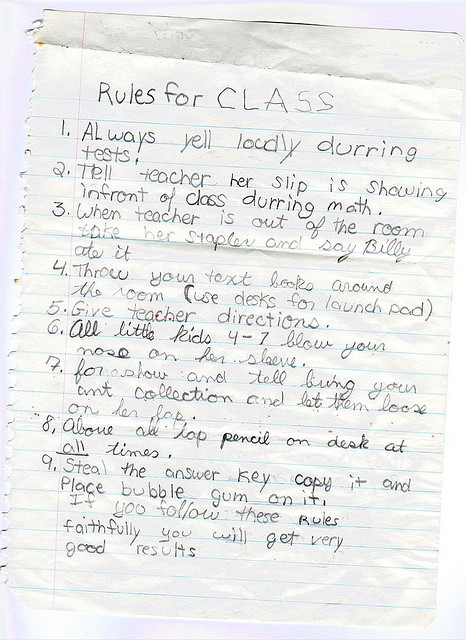Parenting Teens: How to Cope with Mood Swings
What Does that Mood Mean?

Lesson #1: Don't be Afraid to be Wrong
I've raised three girls, and still have one teen at home now. I made a ton of mistakes along the way, and probably have plenty more to be discovered. I've learned that no matter what you do, teens will be difficult for a number of years and then they'll gravitate back to the values you raised them with. You simply cannot do things "right" all the time.
In fact, I wish I hadn't tried so hard in the past!
My perspective comes from my role as biological parent to three girls and stepparent to another who is currently undergoing this stage of her life.
Looking back, I was so concerned with being a good parent to my children that I made more mistakes than I would have if I'd simply been less worried about all those things - you know, the boys, the drugs, the parties. Of course I wouldn't ignore these threats, but today I have a different response.
By the time they left the nest, all four of the grown young women had maintained solid grades, and none had gotten pregnant or arrested. I felt pretty good and thought I'd done my job well. Boy, was I mistaken!
Once they flew the coop, my oldest and youngest became binge partiers. They lost jobs, crashed cars, got into bad relationships, and did the very things I'd worked hard teaching them to avoid! One had children from multiple fathers. Only one of them - my middle girl, with whom I'd always felt a kinship - got married to a good man with a steady income - only to discover a couple years later that he was having an emotional affair over the Internet.
None of these things was my fault, of course. They made the choices that produced the consequences they experienced. However, I questioned myself constantly, especially as the oldest and youngest girl developed a great deal of hostility toward me. They felt I was too judgmental and critical, and I had to wonder.... Would other methods have produced different results? Should I have been more indulgent? Paid less attention?
Today, my oldest daughter is 25 and my youngest will soon turn 22. I still butt heads with my oldest girl. She's definitely her mother's daughter! As she comes to recognize that she truly is following in my footsteps and making some of the same costly mistakes I made, our relationship has been improving, but we still get along best in small doses.
My middle girl, who called me two or three times a week until last December, has decided not to talk to me because when her father called me about her sudden decision to cover both arms and her body with tattoos, I talked to him about her marital situation and how it may have contributed to her sudden behavior changes.
My youngest girl, who was the first to rebel and the hardest to reach, told me the other day that she and her sister had been unfair to me, partly because they'd heard so much criticism about me over the years from their father, who has a tendency to call women "crazy" when they disagree with him, and who admits few faults of his own. She tells me that many of the lessons I'd tried to teach her came back when she faced the very situations I'd preached to avoid. She said, "That's why I'm doing better now, Mom."
Lesson #2: Find Acceptance
My daughters' biggest complaint had been that I was too judgmental, something I initially found hard to believe. I had always told them that I'd made mistakes, too. I'd described why I thought my poor decisions were a good idea at the time, and what I'd learned the hard way. Using techniques from the gazillions of articles I'd read along the way, I told them how bad decisions wouldn't make them bad people, but it would produce bad results that I hoped they'd be able to avoid better than I had.
But a little voice kept reminding me that perception is reality. If they thought I'd been too critical, then in their experience, they'd had a critical, overbearing mother. Worse, they would continue to perceive criticism even where none was intended. Even though I understood this rationally, I had no idea what to do about it. If I hid my thoughts, they'd accuse me of being insincere or even dishonest, I believed.
Meeting my husband marked a turning point in my perceptions and attitudes. His daughter, then 14, was a beautiful girl not yet fully rebelling. Her cooperative attitude and genuine likableness helped us bond quickly, and I watched and learned from her close, affectionate relationship with her dad.
When she was caught lying, failed a test, or damaged an expensive appliance due to poor judgment, his response was brief and loving. He didn't try to understand her by asking question after question, as I'd done with my daughters. He didn't use other teens as examples, as I'd seen other parents do. He told her he trusted that her intentions were good and told her what action he wanted to see instead.
It worked very well. At least, most of the time.

Lesson 3: Learn How to Enforce Rules & Keep Respect
In the two years since, this particular young lady's personality has undergone a shift. I'd originally been impressed by the way she responded to my husband's methods. Though she, like most kids, would deny wrongdoing if she thought she might escape "getting into trouble," she'd come around and talk honestly and openly with her dad and, to a lesser extent, me. When she did, her honesty and candor were refreshing.
Over time, complex challenges entered her life. Without breaking a single rule, she was faced with difficult situations that she couldn't bring to her dad or me, fearing we would interfere with her independence when it came to relationships that were extremely important to her. "I don't want to talk about it" has become a familiar refrain in our household.
After one of those important relationships disappeared on her, she blamed herself. She still does. It shows in her schoolwork, her negative attitude that suddenly permeates every interaction, and in how she treats her body - adding multiple ear piercings on the sly, coloring her hair without permission, shifting her friendships away from the young women she's known for years to shady characters whose social media posts talk about getting high and drinking. (These are clear signs that she herself is probably getting high and drinking.)
Our response, still in progress, is to address the standards that we can enforce, rather than trying to monitor those we can't. As difficult as it is to admit, she will be able to use drugs or alcohol if she wants to, and the best we can do is set a good example and hope she's adopted enough of her dad's values to keep her safe.
I wouldn't have said that ten years ago. I'd have bought drug tests and put my kid on lockdown and possibly in rehab for failing it! Today I realize that every adult somehow came to their own terms with all the threats that surround them - driving cars, using drugs, drinking, and setting goals for themselves - and so will every soon-to-be-adult. They will adopt their own values. A parent's job is to make sure their child has tools to stay safe as they develop them - all at a time when teens' brains are undergoing major physical shifts that seem to produce the worst judgments ever.
What can we enforce? Ideally, not more than two or three major rules. We are focusing on grades and positive attitude - two measurable objectives. If she doesn't maintain certain standards, she faces consequences. More than a couple of categories will only result in the kind of power struggle my children thrust back at me once they stopped feeling like they were under my thumb.
She knows if she doesn't maintain a certain grade standard, she does not have the freedom to leave the house without one of us. She can choose to let her grades slide, or choose to devote enough time to keep them at the standards we've outlined.
If her attitude is uncooperative, she will not get the things she likes that require cooperation from us, like a ride home from school or money for a concert.
We're as firm, fair, and consistent on these two topics as we can be (admit it, nobody's perfect!) and always, always turn back to Lesson 2. We hug her often, tell her we love her, and that we enjoy her presence, especially when it's hardest to show it. As a result, she knows they're not flexible and doesn't balk at paying the consequences when she has let herself down. (She still grumbles plenty!) For the most part, she still wants to eat dinner as a family, go on short trips with us even when she's given an option to stay with other family members, and talks to us - in generalities - about what's going on in her life. Her teachers report that she's pleasant and cooperative, and other adults enjoy her company. I've come to believe that's a pretty good result.

Lesson 4: Recognize Your Teen's Motivations (And Your Own)
Our responses aren't the only way, or even the best way, to handle a teen's moodiness.
Two things motivate people of all ages: Fear of painful consequences, or anticipation of pleasure. Although both can affect every individual, most of us are far more responsive to one of these than the other. My middle child avoided discomfort, so she went out of her way to avoid criticism, but was skeptical of people who offered praise. My other two, as well as my stepdaughter, are more likely to do the "right" thing if they anticipate hugs and pats on the back.
I'm usually motivated by fear of consequences more than approval, which lent itself to my anxiety and controlling behavior. My husband, who isn't worried about the consequences of her behavior (but is very concerned about keeping a good relationship with her) adopted a lax approach.
By recognizing her need for positive regard as a means to motivate her, and our own motives, we can strike a balance that is "minimum control necessary," allowing her freedom to seek positive regard from her friends that mean so much to her these days, without backing off so much that she becomes a danger to herself or others.

Lesson 5: Put One Foot in Front of the Other
No matter what methods you use to cope with your teen's moodiness, their teenage rebellion will eventually pass. Every adult you know, including yourself, went through a stage just like your son or daughter is going through right now, and most of us have survived it and become productive members of society.
No, my children will probably not become the next changing-history-forever-and-getting-rich-along-the-way entrepreneur, but only because that's not where their interests lie. They've chosen paths that might not have been exactly what I'd hoped, but their journey is precisely where they want to go and they're well on their way to whatever they see at its end.
The teenage years are so difficult because our kids have to define their own path using their imperfect judgment in order to become the independent adults that we want them to be. Once they've accomplished that task, they'll come back with arms (and eyes) opened.








